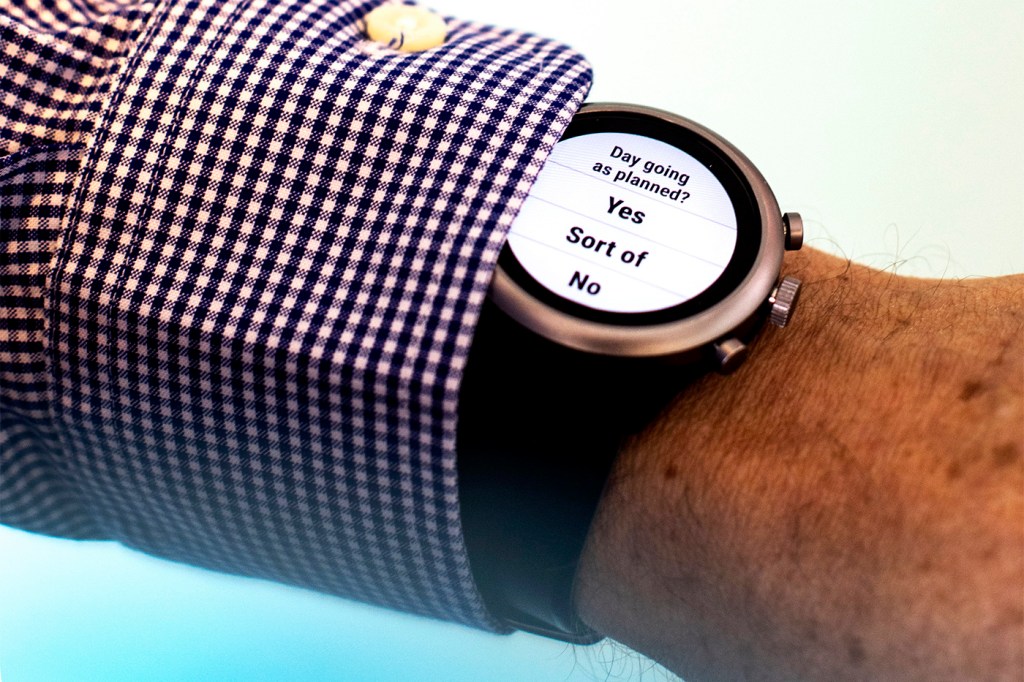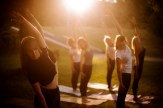Northeastern University professor combines computer science with health and measurement with self-reporting to improve accuracy of fitness tracking

Smart fitness trackers are actually pretty dumb. And, when it comes to keeping track of activity, so are humans. Your smartphone’s accelerometer, which measures movement, can confuse one type of motion for another. And you? Odds are you’ll be way off if you try to guess how much activity you get—even further off if you try to guess how little.
Instead of relying on current, incomplete methods of tracking health, associate professor Stephen Intille is trying something different, something to ideally reduce the number of people who toss their Fitbits in a drawer, disillusioned by the device.
The trick, Intille says, is combining—and refining—current methods: supplementing the fitness trackers’ physiological measurements with questions that the wearer answers in real time. This serves to fill the void between the numbers that represent someone on a screen and the nuances of that person’s life.
Say Jane Doe’s phone moved at three miles per hour for 37 minutes on Tuesday, then on Thursday at the same speed, but for only 18 minutes. Was this part of a routine Jane has? Does Jane have trouble sticking to that routine? Does Jane have a pet? Was she walking that pet? And also, maybe most importantly, how was Jane feeling during all this?


Until a fitness tracker can know, for example, that Jane is struggling to find time for longer walks, it’s only that—a tracker. However, if it could collect enough information about Jane’s moods and schedule to encourage her, at just the right time, to take Fido for an extra lap, it then becomes a tool for intervention. And Jane might be motivated enough to make a change.
Current fitness interventions might be unsuccessful because they don’t account for the complexity of people’s lives, says Intille, associate professor in both the Khoury College of Computer Sciences and the Bouvé College of Health Sciences. But, with a device that capitalizes on Intille’s work—a sort of ‘next-generation Fitbit,’” as he says—things could change.
So why aren’t fitness trackers already at this point? To start, some people just don’t want to answer questions; as Intille says, “you’re giving up a lot of privacy and security already right now for these apps that you’re using.”
But let’s assume people do comply. Even then, many standard data-collecting questions don’t lend themselves to accuracy—and this is true of both formal research studies and commercially available health technology. There are too many options, the questions are too vague, and suddenly you’re struggling to recall how you felt on a scale of 1 to 10 in the past 30 days.
This ambiguity, paired with spotty memory, can also just make the questions unpleasant to answer, which can lead people to lose interest. Even if a question pops up automatically on a smartphone and is part of a research study, Intille says, if it doesn’t take as little time and effort to answer it as it does to ignore it, people are unlikely to sustain this activity for long periods of time.
So Intille is asking simpler questions, and fewer of them at once, but more often.
Many researchers fear interrupting people frequently, since they’re worried it’ll cause burnout in participants. But, Intille says, getting interrupted more often, if little is required of you each time, is “surprisingly sustainable.”
“It’s not uncommon that when your phone asks you, there’ll be eight to 10 questions, multiple choice,” Intille says. “We’re trying to show that asking more often in a very simple way might be just as useful in some scientific contexts.”
Through persistent-yet-tolerable measurement, fitness tracking software may eventually craft a more complete picture of a person’s health. That could help an individual receive more personalized tips and interventions, but the reach could be much broader, says Intille.
“If we can improve the measurement of the behavior, we can actually improve science quite a bit,” he says.
When self-reported, records of activity levels or diet can be incomplete or inaccurate, and that hurts not only the person reporting them but also the studies that aggregate those reports.
“That noise in that measurement is one of the reasons why in the news you will sometimes hear, ‘this is good for you,’ and then a couple of months later, ‘this is bad for you,’” says Intille.
So more comprehensive measurement could improve health not only for the owners of fitness trackers but for anyone who’s ever Googled, “Is activated charcoal healthy?” By measuring, precisely, the state of people’s bodies and minds—and not relying on their faulty recall to do it—maybe one day we’ll find out.
For media inquiries, please contact media@northeastern.edu.





